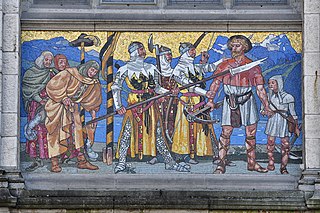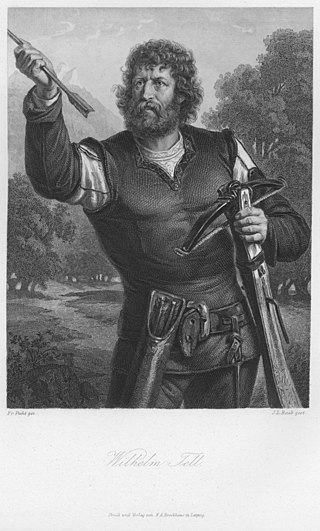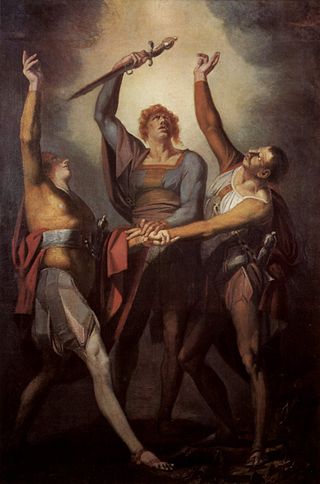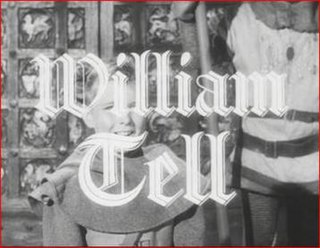See also
- Guillaume Tell (disambiguation)
- Guillermo Tell (1929), a painting by Surrealist painter Salvador Dalí in which represents his ongoing conflict with his father
William Tell is a hero in Swiss legend.
William Tell may also refer to:

Gioachino Antonio Rossini was an Italian composer who gained fame for his 39 operas, although he also wrote many songs, some chamber music and piano pieces and some sacred music. He set new standards for both comic and serious opera before retiring from large-scale composition while still in his thirties, at the height of his popularity.
Maya may refer to:
Pygmalion or Pigmalion may refer to:

William Tell is a French-language opera in four acts by Italian composer Gioachino Rossini to a libretto by Victor-Joseph Étienne de Jouy and L. F. Bis, based on Friedrich Schiller's play Wilhelm Tell, which, in turn, drew on the William Tell legend. The opera was Rossini's last, although he lived for nearly 40 more years. Fabio Luisi said that Rossini planned for Guillaume Tell to be his last opera even as he composed it. The often-performed overture in four sections features a depiction of a storm and a vivacious finale, the "March of the Swiss Soldiers".

William Tell is a legendary folk hero of Switzerland. According to the legend, Tell was an expert mountain climber and marksman with a crossbow who assassinated Albrecht Gessler, a tyrannical reeve of the Austrian dukes of the House of Habsburg positioned in Altdorf, in the canton of Uri. Tell's defiance and tyrannicide encouraged the population to open rebellion and to make a pact against the foreign rulers with neighbouring Schwyz and Unterwalden, marking the foundation of the Swiss Confederacy. Tell was considered the father of the Swiss Confederacy.
A grand hotel is a large and luxurious hotel, especially one housed in a building with traditional architectural style. It began to flourish in the 1800s in Europe and North America.

Walter is a German and English masculine given name of Germanic origin, composed of the elements walt- "power", "ruler", and hari "army".
The sky is the area above the Earth as seen from the ground.

The William Tell Overture is the overture to the opera William Tell, composed by Gioachino Rossini. William Tell premiered in 1829 and was the last of Rossini's 39 operas, after which he went into semi-retirement. The overture is in four parts, each following without pause.
Destiny is a predetermined course of events or fixed natural order of the universe.

William Tell is a drama written by Friedrich Schiller in 1804. The story focuses on the legendary Swiss marksman William Tell as part of the greater Swiss struggle for independence from the Habsburg Empire in the early 14th century. Gioachino Rossini's four-act opera Guillaume Tell was written to a French adaptation of Schiller's play.
Othello is a tragic play by William Shakespeare, believed to have been written in 1603.

Crossbow is a 1987 historical drama action adventure television series that aired on CBN Cable Network. The series was produced by Steven North and Richard Schlesinger for Robert Halmi Inc., in co-production with French television network FR3, and filmed entirely on location in France.

The Rütli Oath is the legendary oath taken at the foundation of the Old Swiss Confederacy by the representatives of the three founding cantons, Uri, Schwyz and Unterwalden. It is named after the site of the oath taking, the Rütli, a meadow above Lake Uri near Seelisberg. Recorded in Swiss historiography from the 15th century, the oath is notably featured in the 19th century play William Tell by Friedrich Schiller.
The Sword in the Stone may refer to:

The Adventures of William Tell is a British swashbuckler adventure series, first broadcast on the ITV network in 1958, and produced by ITC Entertainment. In the United States, the episodes aired on the syndicated NTA Film Network in 1958–1959.
The Barber of Seville is an 1816 opera by Gioachino Rossini.

Sabrina is a feminine given name derived from Proto-Celtic *Sabrinā.
Titanic was an ocean liner that struck an iceberg and sank in the North Atlantic Ocean in 1912.
William Tell is a 1903 French silent short film directed by Lucien Nonguet and distributed in France by Pathé Frères. The original French title is Guillaume Tell. It is the first film adaptation of the eponymous play by Friedrich Schiller.